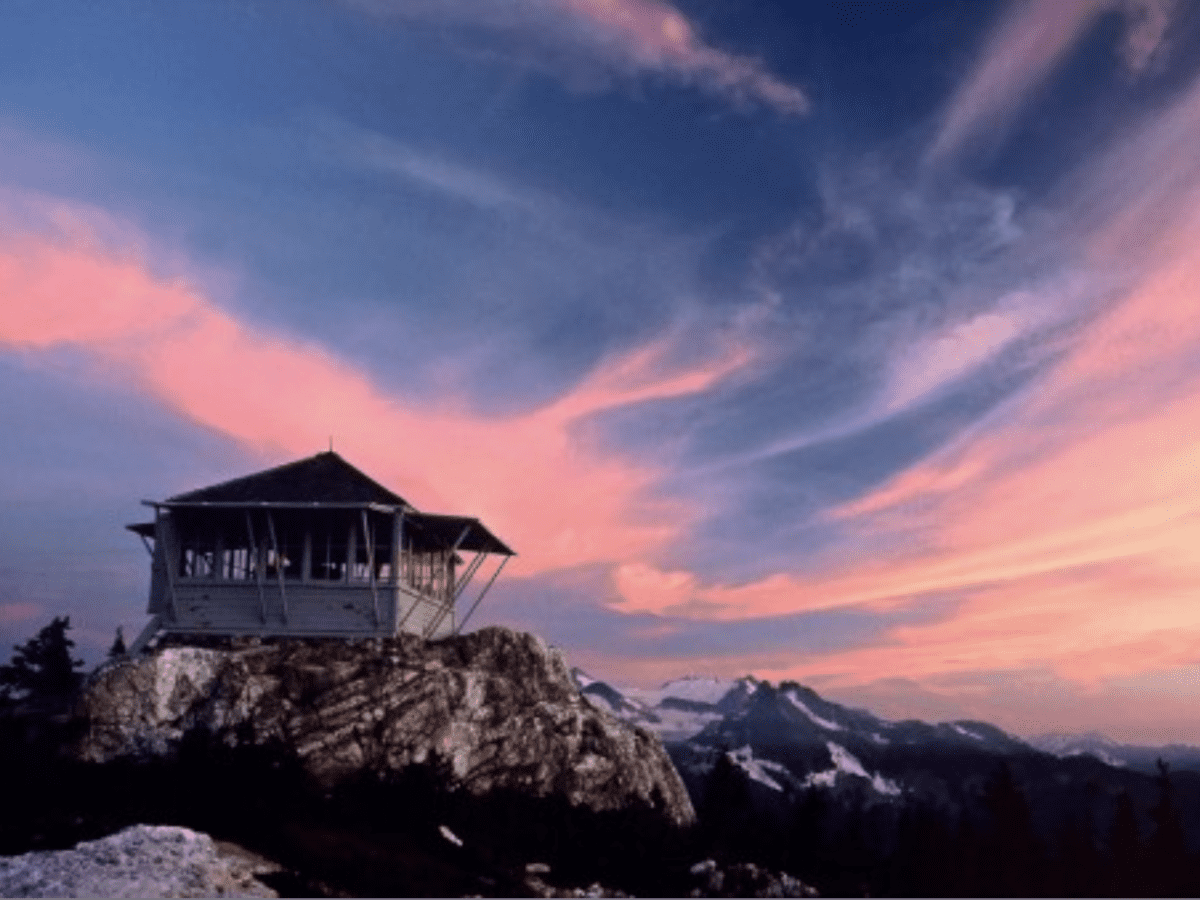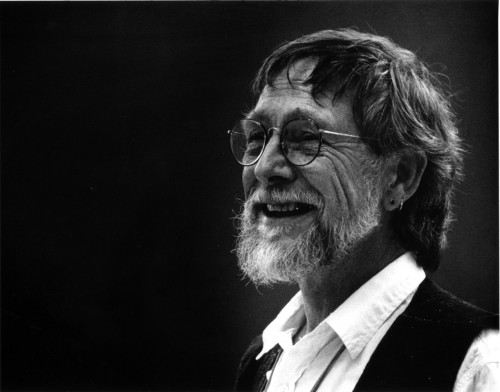
Gary Snyder’s “August on Sourdough, A Visit from Dick Brewer”
“August on Sourdough,
A Visit from Dick Brewer”
Poem by Gary Snyder from The Back Country; a reading by Rob Rich
You hitched a thousand miles
north from San Francisco
Hiked up the mountainside a mile in the air
The little cabin – one room –
walled in glass
Meadows and snowfields, hundreds of peaks.
We lay in our sleeping bags
talking half the night;
Wind in the guy-cables summer mountain rain.
Next morning I went with you
as far as the cliffs,
Loaned you my poncho – the rain across the shale –
You down the snowfield
flapping in the wind
Waving a last goodbye half hidden in the clouds
To go on hitching
clear to New York;
Me back to my mountain and far, far, west.

Just behind the North Cascades Environmental Learning Center, Sourdough Mountain looms. This fabled peak has enjoyed a front row seat to generations of comings and goings in the Upper Skagit: a glacial lake draining, indigenous peoples journeying to quarry ancient sea-floor stones, newcomers paving Route 20 through gorges, your car rumbling through them.
By the time Frank Davis crowned Sourdough with its first fire lookout in 1917, the emerging US Forest Service was just beginning its policy of fire suppression. By the time Gary Snyder came to Sourdough in 1953, the Civilian Conservation Corp had replaced the original lookout and suppression efforts had intensified.
The previous year Snyder was stationed a few crow-miles away, on Crater Mountain Lookout. Once at Sourdough, he wrote: “I kept looking across to Crater…and get[ting] the funny feeling I am up there looking out, right now.” In many ways, this second year in the North Cascades became a seed experience for the poetry he is best known for: language full of the raw, playful wit that reflects the granite ridges where he worked and watched and wrote.
Poet Robert Hass has noted that “August on Sourdough, A Visit from Dick Brewer” concerns itself with the genre of leave-taking common throughout poetry of China and Japan. By 1953, Snyder was preparing earnestly for his decade of Buddhist study in Japan, and he surely would have come across Buson’s great haiku:
You go,
I stay;
Two autumns.
Like Snyder’s poem, Buson hints that guest and host change together, revealing that a goodbye is a change that is never singular. There is the change in you, the change in me, and the change in us. Snyder had the chance to see this with several visitors that came to Sourdough, including Brewer, a friend from Snyder’s undergraduate years at Reed College. Brewer had been subletting the apartment in San Francisco that Snyder shared with Philip Whalen, who was downriver at Sauk Mountain that same summer.
The poem evokes hospitality as a clear and expansive offering on the mountain, and its rhythm invites us in with spirited freedom. In phrases like “meadows and snowfields, hundreds of peaks” we hear Snyder’s subtle play with sound and stress, techniques which help us to cherish their moments of connection.
At the same time the rhythm also makes the parting all the more touching, as in its heavily stressed ending on “far far west.”
Still, in “waving a last goodbye / half hidden in the clouds” we do not get the sense this departure is rigid or fixed.
On August 30, Snyder also would come off the mountain in the season’s first snow. But perhaps it is the shared moment that Snyder returned to, the mountain a still point against loneliness and desire. The mountain may have moved with the departure, but at a pace of steady consolation. It offers a direction and a hope, having seen more than Snyder will ever feel and know.
Rob Rich is a naturalist and writer. He holds a BA in Environmental Studies from the University of Montana and a MS in Natural Resources from the University of Vermont. Rob is completing a Communications Internship with North Cascades Institute as part of further studies in writing at Western Washington University. He also works on contract with the Whatcom Land Trust and serves as a board member for the Nooksack Salmon Enhancement Association and the Natural History Network. You can find his writing in High Country News, Sierra, Camas, The Catch, Northern Woodlands and Adirondack Journal for Environmental Studies. You are likely to find him prowling the woods and beaver ponds near his home in Bellingham, where he loves to seek out the songs of Pacific wrens.


Is there a typo on the poem?
“Thy little cabin” ==> The little cabin
best
Walt Lewallen
We looked the poem up again and it does appear to be “thy” – thanks for reading so close!
In A Range of Poems (Fulcrum, 1966) it’s “the,” which makes much more sense. I assume Snyder had the opportunity to proof the poems there and make corrections/changes.
I cannot find the place I read “Thy” and accept your reasoning and research – Thanks for caring Walter and Dorsey…every word counts!
In The Back Country, Snyder’s New Directions collection of 1967, it’s “The.”
I think, for any seasoned reader of Snyder, the word “thy” would be a problem, evoking religious and dated contexts that don’t work with the poem.
I’m with Dorsey: I think Snyder would want “the.”
But where did you look it up, Christian? Maybe Snyder altered the poem later.
cheers,
Walt Lewallen